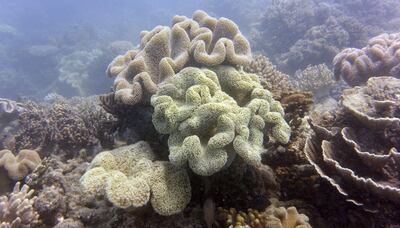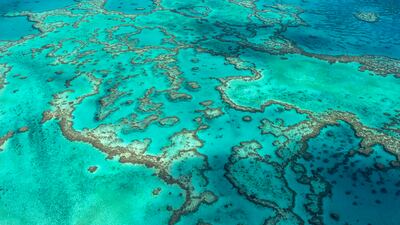The Great Barrier Reef will not be downgraded to an "in-danger" world heritage site by Unesco, despite extensive damage to the ecosystem's corals.
The World Heritage Committee is currently meeting in China for its annual session to review the list of sites with Unesco's coveted World Heritage designation. If the committee is unhappy with the state of a site's conservation, it can be listed as in danger or even deleted, as happened this year with the English city of Liverpool's waterfront.
After a lobbying effort by Australian authorities, members of the World Heritage Committee voted to give them more time to conserve the reef. Despite experts' recommendations that the reef's World Heritage status be downgraded because of dramatic coral decline, Australia was granted an extension and will re-report on the reef's status in 2022.

The 2,300-kilometre-long ecosystem has suffered three mass coral bleaching events since 2016, caused by rising ocean temperatures. Areas once teeming with marine life and vibrant corals have become wastelands, with two-thirds of the reef believed to have been damaged in some way.
In spite of this, the reef remains a vital tourist draw for Australia, which had feared that an "in-danger" label might deter post-pandemic visitors. Australia's Environment Minister Sussan Ley flew to Paris earlier this month to personally lobby member states on the committee, while key ambassadors were invited on a reef snorkelling trip.
A decision on the reef's status had already been postponed from 2015, when Australia successfully waged a similar diplomatic campaign and committed billions of dollars to reef protection.
The decision was met with anger by conservationists. "This is a victory for one of the most cynical lobbying efforts in recent history," said David Ritter, chief executive of Greenpeace Australia Pacific. "This is not an achievement – it is a day of infamy for the Australian government."
Though Australian government scientists say corals have shown signs of recovery in the past 12 months, they admit the reef's long-term outlook remains "very poor”. As well as coral bleaching, the reef is also susceptible to damage from cyclones and outbreaks of crown-of-thorns starfish, which eat the coral.

Venice has also managed to avoid the “in-danger” list, merely weeks after implementing a ban on large cruise ships sailing into the city centre. The city has been on Unesco's heritage list since 1987, but in June the UN body warned of the need for "more sustainable tourism management".
Italy's Culture Minister Dario Franceschini welcomed the decision, but said "attention on Venice must remain high", underlying the need to identify a "sustainable development path".
For years, campaigners have been calling for an end to cruise ships sailing past St Mark's Square. They say the giant floating hotels cause large waves that undermine the city's foundations and harm the fragile ecosystem of its lagoon.
According to the government's ban, the largest ships will be banned from entering the Basin of San Marco, the Canal of San Marco and the Giudecca Canal as of Sunday, August 1.


